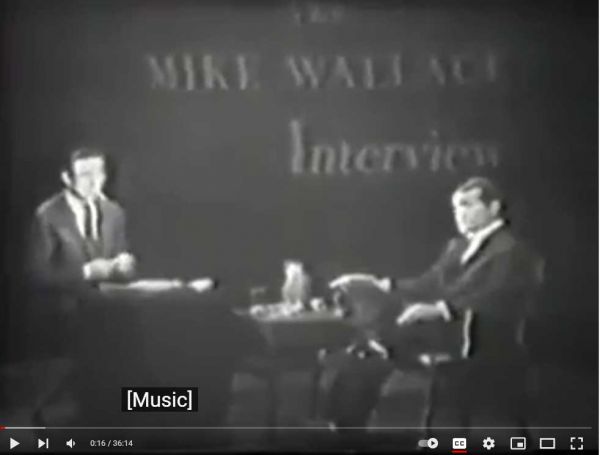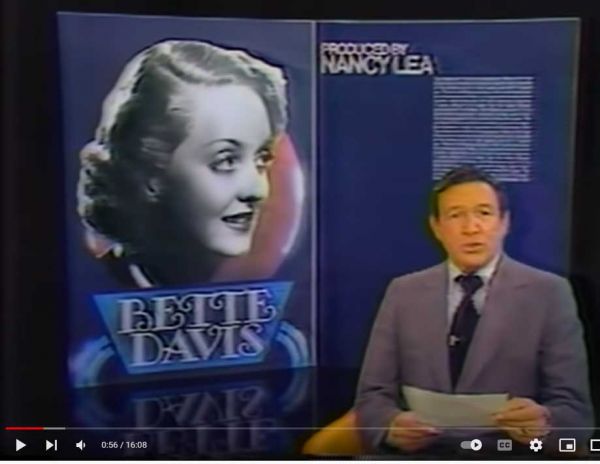Go Back to Church, part II
A Sense of Self
In the old days, the television journalist Mike Wallace held a pretty high position in the CBS News Department. He had a singularly tough, confrontational way of interviewing guests. He made himself many enemies for his way of extracting confessions or exposing wrong-doing. He held the evidence of malfeasance in front of his guests like a damn prosecutor. The higher-ups at CBS sometimes winced at the way he skewered important public figures, but they said nothing publicly about Wallace until after his death. His confrontational style appeared again in the person of Tim Russert who hosted the news program Meet the Press until his death.
Mike Wallace interviews TV personality Rod Serling in the early-60s.
I learned through Mike Wallace's interviews that most highly-visible Americans people have separate identities, one for their public appearances and a closely-held identity for their private lives. I know this because, during their interrogations by Mike Wallace, they sometimes had to switch faces. Public figures know they have to keep a straight face, so to speak. By acting two-faced with someone like Mike Wallace, they expose themselves to accusations of hypocrisy or dishonest—just by averting their eyes, for instance, they give themselves away. Actors and actresses do best in such circumstances, since they engage in role-playing as a matter of course.
Bette Davis interviewed by Mike Wallace
In one notable instance, Wallace was doing an exposé of real-estate swindles in Connecticut. As his guests sat in the studio, he introduced them to the man who had swindled them out of thousands of dollars. The couple greeted the swindler as if at a cocktail party: "How do you do?"
Wallace affected amazement and said to them, "This is how you greet a man who stole from you?"
As if on cue, the swindled couple changed from friendly accessibility to angry scowls, whereas the street-savvy swindler stared at them unmoved.
Wallace taught me that most people in modern America give up an integrated, enduring sense-of-self, as a matter of course. Modern Life requires us to mesh gears with our social environment, thus sidestepping conflicts that might damage relations. Americans expect the same standards of behavior in others, so that they can interact profitably with each other and accomplish tasks with cordiality, without having to cross the line into antagonism and coercion. But deep down, we need to know who we are and when to stop. We need to recognize bullying and stampeding and step away from the tumult to sort out either the real intentions of our counterpart, or measure the deviation from our intended direction..
We think we know other people, but we may know only one aspect of them. We see another side, if disagreements disable the mask of agreeableness and unleash paranoia and accusations. After the futility of trading accusations sinks in, we hang back and let the lawyers determine if there is something actionable in the disagreements. The disagreement may require some mending of relations, as well as rebuilding the fences of separate identity.
We try to define ourselves and each other through hearing rote doctrines in church, the dramatized presentations of the news we hear on the TV, or through input from friends and family members; but cross-currents in our thought-process may lead to contradictions that confuse others, as well as ourselves.
Exposés, like Mike Wallace's, involve unearthing the "real" feelings or attitudes of interviewees or ideological groups—when, in truth, there is no such thing. They run into problems when they cross from one social environment into an opposing one and do not check their bearings. Mike Wallace's exposés really speaks of human ambiguity.
I no longer read the Bible or attend church, myself, but I retain a Christian viewpoint, inasmuch as I believe that a philosophy, doctrine, and some version of unalterable truth should define a person. A church-oriented life does this, inasmuch as it shods people in sturdy ideological boots and gives them an orientation that enables them to risk death.
Someone needs to remind you who your friends are, who your enemies are, what direction you are going, and what your personal values are. In the hub-bub of daily life, jostled by human interaction, you tend to forget, under pressure from others. A church that teaches only tolerance, equivocates on the value of other religions, and advocates a pointless acceptance of others' diverging opinions will produce an empty church—witness the Episcopal Church. Churchgoers want self-definition and a sense of direction.


